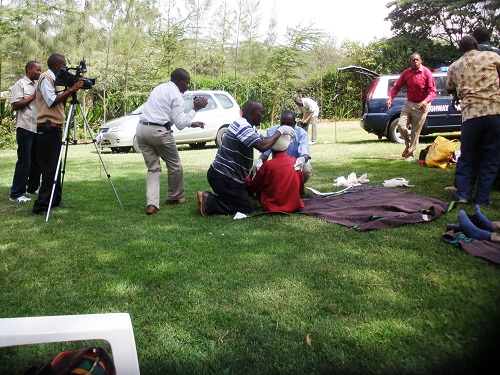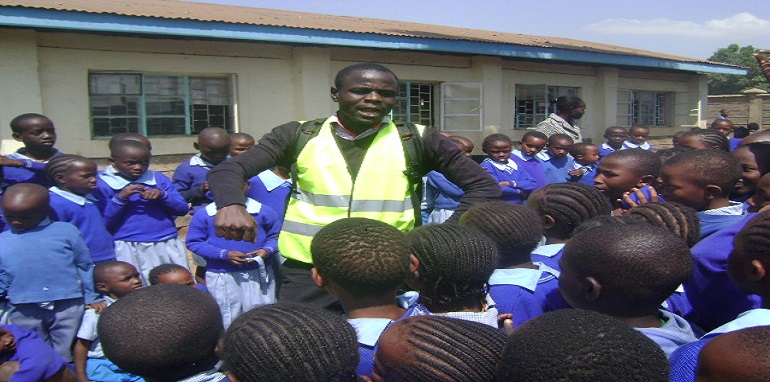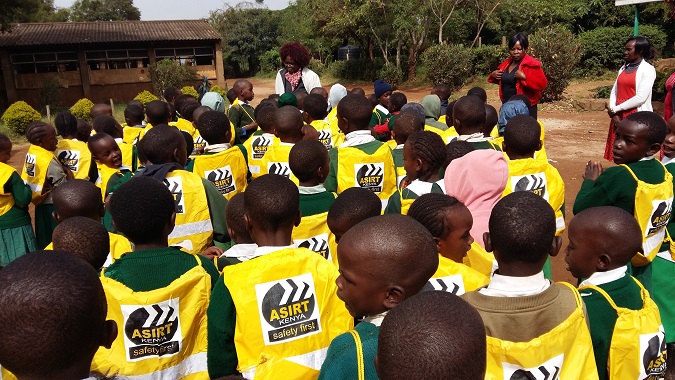First responder Courses for matatu drivers and traffic police
The objective of the course is :
In many incidents the PSV drivers are the first on the scene of many road crashes on major highways across the country. This makes them a possible first resource when it comes to response and assistance to the victims. Many road traffic victims have suffered permanent disability in the hands of untrained responders. To reduce these unfortunate cases of victims being mishandled there is need to train majority of the road users especially the PSV operators and the police who end up dealing with over 70% of cases.
The Association for Safe International Road Travel (ASIRT Kenya) in collaboration with the Emergency Nurses Association of Kenya (ENAK) and other partners conduct these courses with logistical support from Matatu operators and the traffic police who recommend the trainees.

First responder training for traffic police and PSV drivers
Results include:
School safety program
A growing epidemic of road traffic crashes is devastating the next generation of children around the world. Every 30 seconds a person is killed in a road crash. More than 3300 per day and over 1.2 million people per year die in road crashes worldwide. As many as 50 million are injured. Vulnerable road users particularly at risk, are children. 500 children die every day in road crashes. In many Asian, African, and Middle Eastern countries between 40 and 50 per cent of people killed as a result of a road crash are pedestrians.
In Kenya adults and children are killed every day as a result of road crashes, and tens of thousands are injured, often suffering lifelong disability.
According to the National Transport and Safety Authority (NTSA) statistics, a total of 2,965 people lost their lives in road crashes in 2016.
Children are vulnerable road users. Anywhere where there is a potential for moving vehicles is a potentially dangerous traffic situation for children. This is because children:
ASIRT Kenya's interventions towards child safety include:
ASIRT Kenya partners with various schools that are near roads and have a record of children being involved in road crashes. The programs involve training of teachers, parents and students.

St. Dominics primary School, Mwiki Kasarani Sub-county.
The children and staff teachers were trained on safe use of roads and given reflective sashes to promote their visibility on roads.
2. Promote localized road engineering to keep children safe on their school journey.
This involves mapping out areas near schools and on the school route that are crash prone and have recorded high numbers of crash incidents. These areas require signage and road calming measures like speed bumps and rumble strips. ASIRT Kenya advocates and engages the relevant authorities to push for modification of the environment. This is done by partnering with relevant authorities in the country
Kasarani primary school
With partnership with City Council, a zebra crossing was put on the road at the entrance of the school to facilitate the safe crossing of roads.
3. Encourage and assist parents in forming street crossing patrols for their children.
Through partnering with schools and having access to PTAs, parents are advised to teach their children about road safety. This is sensitization during parents meetings and other interactive school activities. .
With partnership with Usalama Watch Initiative, a person was stationed at the road with a stop and go sign (lollipop) to stop traffic and allow children to cross the road safely.
4. Help communities get organized as a key part of creating the long-term cultural changes that will keep children safer on the roads.
Through sensitizing of people in the community. Plays and skits are carried out during weekends and school holidays that emphasize road safety in a fun way that will engage the children and general public in the accident prone areas.
5. Use of reflective material to promote visibility
Upon completion of the sensitization program, we then issue reflective materials to the children to aid in making them visible when on the roads. These have included sashes, bags and bracelets.

General Kago Primary school Thika, children are issued with reflective bags to aid their visibility on their way to and from school